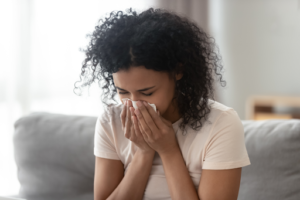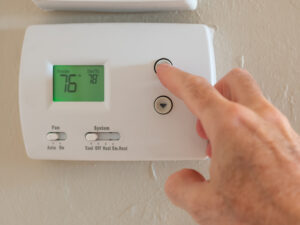Poor indoor air quality (IAQ) cannot be seen; however, this invisible hazard can negatively impact you and your family members’ health and comfort. Even when everything else in the home seems clean, poor IAQ can still lead to health problems that worsen over time. As the leading provider of IAQ services in Jonesboro, AR, our team has put together a list of signs your home has poor indoor air quality. If any of these conditions apply to you, it’s crucial to get in touch with one of our technicians today to conduct professional testing.
Persistent, Cold-Like Symptoms
One of the biggest signs that you have poor indoor air quality in your home is your family exhibits poor health for extended periods of time. If your family members continuously experience symptoms such as coughing, sneezing, nausea, dizziness, or irritation of the eyes, nose, and throat for an extended period, it’s likely not just a common cold or flu.
It’s crucial to monitor the frequency and severity of these symptoms. Do your symptoms improve once you leave your home, perhaps when you’re at work or school, only to worsen upon returning? If this pattern holds, it’s reasonable to suspect that your home’s air quality could be the culprit.
Accumulation of Dust
Check the air vents throughout your home. Do you notice a significant buildup of dust in and around them? Even if you recently replaced your air filter, visible dust accumulation could indicate an unusually high level of pollutants in your indoor environment. Consider upgrading to a more efficient air filter to effectively capture dust particles circulating in your living space.
Unpleasant Indoor Odors
Unpleasant odors lingering in your home are often a result of stagnant air. In fact, mold and mildew growth is common when humidity levels become too high, and dust, pollen, and pet dander can build up if your home’s air isn’t properly filtered. If you’re dealing with persistent odors, scheduling a duct cleaning service could help refresh your indoor air quality.
Skin Rashes
Unexplained skin irritations, such as rashes or heightened sensitivity, can be linked to various indoor air pollutants. If you’re experiencing unusual dryness or irritation without an apparent cause, it might be time to examine your home’s IAQ.
Trouble Sleeping
Poor indoor air quality can significantly disrupt sleep patterns, with individuals being 60% less likely to achieve optimal sleep efficiency due to elevated air pollution levels. Factors like temperature and humidity further exacerbate sleep difficulties. Addressing any HVAC issues in your home can greatly improve your sleep quality and overall health.
Can Poor Indoor Air Quality Cause Cancer?
Research suggests that prolonged exposure to certain indoor air pollutants may indeed contribute to an increased risk of lung cancer and other chronic diseases over time. Substances like radon, asbestos, formaldehyde, and volatile organic compounds (VOCs) are known carcinogens commonly found indoors. While limiting your use of common household products (such as paints and cleaning agents) can protect the air in your home, it’s still important to have your air tested routinely for potential carcinogens, such as radon (a radioactive gas that seeps into homes from the ground) and asbestos.
Though the direct causal relationship between poor indoor air quality and cancer can be complex and multifaceted, taking proactive steps to improve your home’s air quality is crucial for safeguarding your health and that of your loved ones.
Strategies for Improving Indoor Air Quality
If these signs of poor indoor air quality have you concerned about the particles floating in your air, know that there’s a way to enhance your home’s IAQ. Try one or more of these strategies:
- Regularly Maintain Your HVAC System: Regularly changing air filters, cleaning ducts, and servicing your HVAC unit can prevent the circulation of dust, pollen, and other allergens. At RepairUSA, we recommend scheduling maintenance checks at least twice a year to keep your systems running smoothly and your air clean.
- Use of Air Filtration Systems: Air purifiers are excellent at battling indoor pollutants. They work by trapping irritants such as dust, pet dander, and smoke particles. Consider placing them in high-traffic areas or bedrooms for maximum effect.
- Control Humidity Levels: Too much humidity can create a breeding ground for mold and mildew, which are harmful to respiratory health. Keeping indoor humidity levels between 30-50% can help prevent their growth. Dehumidifiers or smart thermostats can automatically adjust the humidity levels, making it easier to maintain a healthy indoor environment.
- Put Natural Ventilation to Good Use: Whenever possible, allow fresh air to circulate through your home by opening windows and doors. Natural ventilation helps to reduce the concentration of indoor pollutants. Even a few minutes a day can make a significant difference.
Say Goodbye to Indoor Air Quality Issues!
Dust mites, mold, and mildew can lead to all sorts of health complications, including everything from headaches and respiratory infections to sleepless nights. Our team cares about the health and comfort of you and your loved ones, and when the air quality in your home impacts your day-to-day, it’s time to get in touch with RepairUSA. We can properly maintain your HVAC system and implement solutions that restore your environment. For more information about how our services — including AC replacement in Jonesboro, AR — can work to improve your indoor air quality, get in touch with our specialists today.



